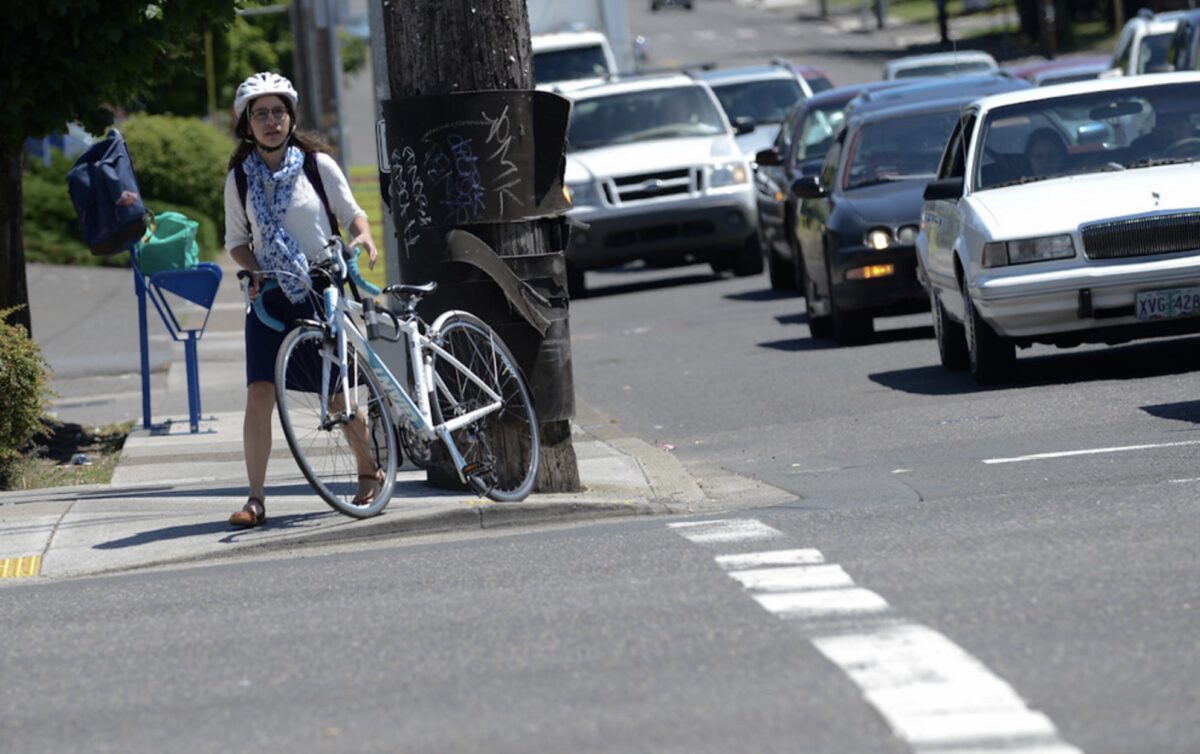
(Photo: J. Maus/BikePortland)
Steph Routh is campaign manager of the Fix Our Streets campaign.

The street that I grew up on in east Portland was not technically part of Portland for the first several years of my life. It remains without sidewalks and boasts a gravel road as the nearest intersection. While there were certainly promises of newly annexed sections of Portland getting all the amenities of a growing city, the service I remember most was sewer hook-up, because it was voice-raisingly expensive (I was young, but I still had ears) and involved a deep ditch that Dad dug himself.
Fixing Our Streets is a program that has kept its promises and is worthy of support, which I don’t say lightly. By the end of this year, the 10-cent gas tax will have funded the full repaving of 40 lane miles, fixed over 400 sections of failing road, connected miles of sidewalks, and delivered another 170 safety improvements. The projects that BikePortland highlighted four years ago as reasons to support the measure in 2016? All of those are in the ground or in process. The sidewalk on Capitol Highway is under construction this summer.
Now the local gas tax is back on the May 2020 ballot as a renewal, with four years of project delivery under its belt; with project selection guided by multiple plans, including Vision Zero and the city’s first updated pedestrian master plan in 20 years.
“Funding for this measure will become available at a time when we will need to invest in economic recovery; and maintenance, street repair, and active transportation projects are great investments in advancing a more resilient future.”
Like the original measure, Measure 26-209 is tied to a specific suite of projects (you can check them out here). This time, over half of those projects are slated for East Portland. These projects include: a build-out of the street lighting system on High Crash Corridors, safer crossings and intersections along gnarly stretches, and an expansion of and retrofit for neighborhood greenways.
Advertisement
Measure 26-209 will also help the city continue to catch up on its significant backlog of maintenance and street repair, which is a win for all modes. While grading gravel streets won’t trigger any ribbon cutting ceremonies, it’s a game-changer for areas with unimproved roadways. Pavement maintenance on decent but declining roads offers a tenfold return on investment. It’s either “pave me now or pay me later,” and that includes taking care of our greenways. Will it fund all of our visions, or even all of our basic needs? No, and for that we need to keep moving forward together. This measure is but one part of a larger solution.
What about the current pandemic? While we address the COVID-19 crisis at hand, we can’t ignore Portland’s future. It’s going to be more important than ever to keep the Fix Our Streets program going, and to put those dollars into efforts that employ Portlanders to do needed safety and maintenance projects on our roads.
Measure 26-209 is a renewal measure, so tax rates will remain the same. It will help knit multi-modal projects into the fabric of east Portland, finally delivering on some of the promises that have been a long time coming. Funding for this measure will become available at a time when we will need to invest in economic recovery; and maintenance, street repair, and active transportation projects are great investments in advancing a more resilient future. This is a sound measure that will humbly make people’s everyday lives better in Portland. Please vote yes on Measure 26-209.
— Steph Routh is campaign manager for Fix Our Streets, Measure 26-209. She is the former Executive Director of Oregon Walks, co-founder of Umbrella and Cycle Wild, and is grateful to be a WTS Portland board member.
— Get our headlines delivered to your inbox.
— Support this independent community media outlet with a one-time contribution or monthly subscription.

